- Home
- Steven Brust
Taltos Page 6
Taltos Read online
Page 6
As he came up, his eyes fell on me and I backed up a couple of steps from the cliff edge out of an instinctive mistrust of Dragaerans. He noticed this and laughed. “So, whiskers, you don’t want to go swimming today?”
When I didn’t say anything, he said, “Answer me. You want to go swimming or not?” I couldn’t think of anything to say so I remained quiet, watching him. He snarled and said, “Maybe you ought to just leave, whiskers, before I send you for a swim whether you want one or not.”
I don’t know for sure why I didn’t leave. Certainly I was frightened—this man was much older than the punks I usually had to deal with, and he looked tougher, too. But I just stood there, watching him. He took a step toward me, perhaps just to frighten me away. I took my lepip from my pants and held it at my side. He stared at it, then laughed.
“You think you’re going to hit me with that, is that it? Here, I’ll show you how to use one of those things.” And he came at me with his hand out, to take it away.
What I remember most vividly is the cold thrill in my stomach as I realized I wasn’t going to let him take my weapon. This wasn’t a bunch of kids out to have a lark and vent their frustration at whatever it was they were frustrated about—this was a grown man. I knew I was committing myself to something that would have far-reaching effects, though I couldn’t have put it that way then.
Anyway, as soon as he was in reach I cracked him one on the side of the head. He stumbled and fell to his knees. He looked up at me, and I saw in his eyes that there wasn’t a beating at stake anymore; that he’d kill me if he had the chance. He started to stand up and I went for him with the lepip. I missed, but he fell over backward, rolled, and came to his knees again.
His back was to the cliff, about two steps behind him. The next time he tried to stand up, I stepped up and very deliberately shoved him backward with the lepip.
He screamed all the way down, and I couldn’t hear the splash over the sound of the waves crashing against the cliff.
I put my lepip back in my pants and walked straight home, wondering if I should be feeling something.
* * * *
“... C’mon, boss, time to get up. There are six Dragon warriors here, and they all want to duel with you. Let’s go! There’s a Dzur hero knocking on the door asking about his daughter, better get up. Okay boss, wake up! The Great Sea of Chaos has just moved into the next bedroom and it insists that you have a better view. Wakey wakey.”
Waking up in the middle of the night, in a damp storage closet, wedged between dried kethna ribs and a tub of lard, with a wise-ass jhereg thundering smart remarks in your mind, has little to recommend it.
“All right, stuff it, Loiosh.”
I got up and stretched, worrying about the sound my joints were making, though that was silly. I buckled on this and checked that. I moved over to the door and spent a few minutes listening to make sure there was no one out there. I opened the door, which was still lubricated. Then left down the hall, eighteen paces, oil the door, open it.
I was in the back of the kitchen. The morning cook wouldn’t be started for another couple of hours, and there were no guards here. I moved across the kitchen and found the door I wanted. Oil, open, walk. If the bastard had been a little poorer, he would have had leather hinges on his doors, which are easier to deal with. Or even empty doorways with curtains. Oil, open, walk. First checkpoint.
This door led down into the sublevels, and there were a pair of Dragaeran guards here, in addition to sorcerous alarms. The sorcery was simple and straightforward; mostly token, and I had what the Left Hand of the Jhereg calls a “device” and an Eastern witch would call a “charm” for dealing with it. The guards would be more difficult. They were more or less facing me and, unfortunately, awake.
I kill people for money; I don’t like doing it when I don’t have to. But sometimes there just isn’t any other way. I studied the guards standing there and tried to think of a way to avoid killing them.
I did not succeed.
Some time before this I had assassinated a certain moneylender who, it turned out, had been skimming more than his share out of the profits. His employer had been very upset and wanted me to “make a 'xample outta the sonufabitch.” The boss arranged to meet the guy in a big, crowded inn at the busiest time. The boss didn’t show; instead, I did. When my target sat down, I walked straight up to him, put a dagger into his left eye, and walked out of the place.
One thing I remember about that is the wave of reaction that followed me out the door, as the patrons of the inn noticed the blood, the body, the event. None of them were able to describe me, though many of them saw me. What I’m getting at is the advantage of surprise—of the attack that comes with no warning whatsoever. One moment all is peaceful, the next there is an Easterner in your face, knives flashing.
I hauled the bodies of the guards into the kitchen so they wouldn’t be quite so obvious, then I picked the lock and headed down into the dungeon.
* * * *
I guess it was my grandfather who really helped keep me going after my father died. It was funny how he did it. I mean, I’ve always hated being alone, but my grandfather felt that, at fourteen, I had to be independent, so he never responded to my hints that I could move in with him. Instead, he spent even more hours teaching me witchcraft and fencing, to give me something to do in my spare time.
It worked, too, in that I turned into a quite passable witch, a very good swordsman in the Eastern style, and that I learned to live alone.
I learned many things during that time, but it’s taken the perspective of years to understand all of them. Like, I learned that to be not alone was going to take money. I had none, nor any means to acquire any (the restaurant I’d inherited from my father kept me alive and that was about it), but the lesson stuck with me, for the future.
I think practicing witchcraft was what did the most for me during that time. I could do things and see the results. Sometimes, in the peculiar trance state that witches fall into when performing, I’d see the entire thing as a metaphor of my life, and wonder if I’d ever be able to take control of my world and just make it be what I wanted.
Later, when I’d recovered from my attempt to take the salt out of seawater, or something equally useful, I’d take my lepip and go beat up a few Orca.
The other thing my grandfather did was insist—as did my father—that I have a good grounding in Dragaeran history. My grandfather found an Eastern tutor for me (he made me pay for it, too) who was quite good at those things, but who also knew something of the history of Fenario, the Eastern kingdom of my ancestors. I learned some of the language, too.
I would occasionally wonder what use these things would have for me, but then I’d start wondering about the rest of my life, and I just didn’t want to think about that.
Oh, well.
* * * *
So I went down. Real quiet, now. My eyes were already adjusted to the dark and there was a dim light from below; I was able to move quickly. The steps were narrow and deep, but solid stone. There was no railing. I concentrated on silence.
I reviewed The Plan: get down to the level where Loraan would—I hope—keep such things as souls contained in staffs, unlock the door (breaking any spells necessary without alerting Loraan), and have Morrolan launch his surprise (we hoped) attack on the keep’s defenses just hard enough and long enough to teleport us both out of there.
It occurred to me again that I’d never before depended on any form of magic to get me out of something. I didn’t like it. I reviewed the various ways I could ditch and run at this point, which took no time at all.
Ah! The bottom!
There was one guard here. Unlike the two upstairs, he was dozing, which saved his life. I made sure he wouldn’t wake any time soon, and continued. Left for twenty-five paces, and to a door. This one was big and strong, and the lock, I’d been told, was serious. I studied it, and it was. But then I’m pretty good.
My fingers twitched as I studied th
e dead-bolt and the hinges. Frankly, though, I was more worried about the spells that sealed it, as well as any that might trigger alarms. I estimated the door itself to weigh about forty pounds. It was composed of thick wooden planks with iron bands around them. It wasn’t perfectly sealed, though, since light was coming from the other side of it. I didn’t know what that meant; this was where my information ended. I licked my lips and started working.
Kiera the Thief had not only found a set of burglar tools for me, but had trained me in their use. I’m not a thief, but I get by. I hoped the “device” was up to overcoming the alarms, because I wasn’t; defeating the lock was the most I could hope for.
A good lock combines a fine mechanism with a heavy bolt. This one had, indeed, a very fine mechanism, and three separate dead-bolts. So the pick had to be strong enough to turn the bolts, but light enough to go into the lock. It turned out to be a three-tumbler system, requiring a spring-pick and three rods, all of which had to be pressed against tumblers going in different directions while being turned in yet a fourth direction. If my fingers had been much smaller and I’d had an extra pair of arms, it would have been much easier. As it was, it took me twenty minutes, but I got it, and no alarms went off as far as I could tell.
I would have forgotten to oil the hinges but Loiosh reminded me. On the other side was a landing with several lamps blazing and stairs leading down to a set of three doors, all of which looked—from up here—to be rather flimsy.
I spent about fifteen minutes locking the heavy door again. This may have been a waste of time; I couldn’t decide. Then I took a couple of deep, silent breaths, closed my eyes, and—
“What is it, Vlad?” One is always on a first-name basis in psionic communication, because magic transcends courtesy.
“I’m past the big door.”
“All right. I’ll inform Morrolan. We’ll stay in contact. As soon as you have the staff in your hand, we’ll break the teleport block. It won’t be down for long.”
“So you’ve said.”
“And I repeat it. Be careful.”
“Yeah.”
Once at the bottom, I had to pick a door. None of them were locked or enchanted, so I chose the middle one. I oiled the hinge and slipped it open. Forty-five minutes later I was back in front of the three doors, and I had a much better idea of the sorts of seashells Loraan liked to collect, and a very good idea of his taste in art, but no better idea of where the staff was.
I wondered how long it would be until someone discovered the bodies in the kitchen, or noticed that the guards weren’t at their posts.
I really hated this. I tried the left-hand door.
The room was lit, though I couldn’t see the light source. It was about forty paces square, with another door opposite me. A large table, say ten feet long, dominated the middle of the room. There were globes suspended from the ceiling, emitting narrow beams of light that were concentrated on a single point at one side, and near this point was a stack of thick, heavy tomes. There was another tome on the table, open, with a quill pen next to it and half a page written in. Small, glittering stones were scattered on the table. Three wands—none of which matched the description of what I was looking for—stood against the wall to my left, and a pedestal at the end of the table held what seemed to be a chain made of gold, suspended in air except for the end that touched the pedestal. A broadsword leaned against the table, and it would have looked incongruous save that from where I stood I could see that it was covered with runes and symbols. Against another wall was a large basin, probably holding something unnatural to which unmentionable things had been done.
In case you haven’t figured it out yet, this was Loraan’s work area.
I studied the floor in front of me for a long time, checking the path to the door opposite. It seemed to be clear. I let my observations flow back to Sethra. She acknowledged but didn’t comment. I crossed very carefully and reached the other door without making a sound.
I studied this door for quite a while. No spells, no bolts, no alarms. I oiled the hinges just to be safe, then opened it. I was in a slightly smaller room, not as cluttered. The only thing of note was what seemed to be a cube made of orange light, about six feet on a side, in the middle of the room. In the center of the glowing cube was a white, five-foot-long staff. At one end I could almost make out the rusty star I’d been told to look for. That was not, however, the only thing in the room. Next to the cube of light, facing it, was a Dragaeran. He stared at me and I stared at him. He is frozen that way in my mind—all of seven and a half feet tall, big, thick eyebrows on a florid face, with long, tangled reddish hair that stuck out at improbable angles. He was old, I guess, but he certainly wasn’t infirm. He stood straight, and his stance reminded me of Morrolan just before he had almost attacked me. I saw the lines of muscles beneath his tight, white blouse, and the blood-red cloak he wore was drawn back, held by a ruby clasp that reminded me of Sethra’s. His brown eyes were clear and unblinking, yet his expression seemed mildly curious, neither frightened nor angry.
Only his hands seemed old—long fingers that were twisted and bent, with what might have been tiny scars all over the backs of his fingers. I have no idea what could have caused that. In his hands was a dark, thin tube, about four feet long, that was pointed at the staff inside the orange cube.
The bastard was working late tonight.
I would almost certainly have beaten him to the draw, as it were, if he hadn’t noticed me coming in. He gestured vaguely in my direction and I discovered I couldn’t move. A black fog swam before my eyes. I said, “Sorry, Sethra, not this time.” And nothing held me as I sagged against nothing, fell in, and was buried.
Chapter 6
I stared at the flickering, weaving dance of the horizon and tried to decide if I liked it, or if it mattered. The thought that I was losing my mind came, and I pushed it aside. It is a not uncommon fear in such circumstances, largely because it sometimes happens. But I just didn’t have time to deal with it then.
My eyes were drawn from the wavering landscape to the sorcery rune I had, for whatever reason, drawn on the ground before me. I blinked and it didn’t go away. I licked my lips.
The rune was glowing. I hadn’t asked it to, but I guess I hadn’t asked it not to, either.
I brought my palms together in front of me, fingers pointing out, and in the air I drew another rune, this one the verb “to summon.” I considered what nouns I might hang from it, shuddered, and almost lost control of the spell. Loiosh pulled me back and I dropped my hands back to my lap.
The rhythm was still with me and the landscape still wavered and the rune on the ground still glowed.
I think the other sound was my teeth grinding.
I was unconscious for about twenty seconds, near as I can figure it. The side of my face still stung from slapping the floor, as did my right hand.
I awoke slowly, and swirls of black dissipated before me. I know better than to shake my head under such circumstances; my eyes cleared.
Loraan was leaning up against the far wall, staring past me, both his arms raised. I turned my head and saw Morrolan, who seemed to be fighting something invisible that was trying to entangle him. Sparks flashed in the air between them—that is, directly over my head.
I was being rescued. Oh, rapture.
I was about to try to convince my body to function—at least enough to get out from between the two of them—when Loraan gave a kind of cry, struck the wall behind him, bounced, and came careening at me. I would have put a knife into him then and there but he fell on top of me before I could go into action.
This is called “not being in top form.”
Loraan was quite agile, though, especially for a wizard. After landing on me he kept rolling until he ended up in the room with Morrolan, as well as the table, the sword, the staves, and all that stuff. He came smoothly to his feet and faced Morrolan.
There was a bit of confused action lasting maybe ten seconds, including smoke and s
parks and fire and loud noises, and when it was over Morrolan had his back to me and Loraan was too far away for any of my goodies to be effective.
Loiosh, who had been so quiet I’d all but forgotten him, said, “Should we get the staff now?”
Oh, yeah. Right. The staff. What we came for.
I got to my feet, a little surprised that they worked, and moved toward the cube of orange light. I began studying the enchantment on it and muttering curses to myself. I didn’t know what it was or how it had been accomplished, but I could tell it wouldn’t be safe to put my hand in there; I could also tell that breaking it would be way over my head. I wondered if Morrolan would be open to taking a job. I turned back to the fight to ask him.
* * * *
I was almost sixteen when I decided I was old enough to ignore my grandfather’s advice, and started carrying my rapier. It wasn’t a very good one, but it had a point, an edge, and a guard.
I’d been carrying it for less than a week before I learned that my grandfather was right. I was heading back to the restaurant from the market at the time. On reflection, an Easterner with a sword at his hip carrying a basket full of fish, meat, and vegetables must have looked a bit absurd, but at the time I didn’t think about that.
I heard laughter as I was near the door and saw two kids, roughly my age (taking different growth rates into account), dressed in the livery of the House of the Hawk. They were clearly laughing at me. I scowled at them.
One laughed harder and said, “Think you’re pretty dangerous, don’t you?” I noticed he was also wearing a blade.
I said, “Could be.”
He said, “Want to show me how dangerous?”
I set the basket down and walked into the alley, turned, and drew, my pulse racing. The pair of them walked up to me and the one with the weapon shook his head in mock sadness. He was quite a bit taller than I, and may have had good reason to be confident.
He took his sword in his right hand and a long fighting knife in his left. I noted that he probably wasn’t going to use sorcery, or his left-hand weapon would have been different. My grandfather’s words came back to me, and I put a little more mental emphasis on the word “probably.”

 Phoenix
Phoenix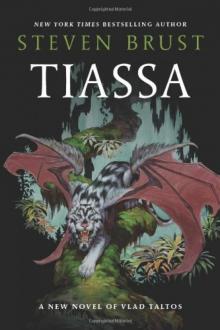 Tiassa
Tiassa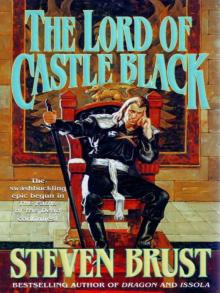 The Lord of Castle Black
The Lord of Castle Black To Reign in Hell: A Novel
To Reign in Hell: A Novel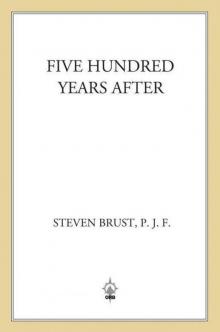 Five Hundred Years After (Phoenix Guards)
Five Hundred Years After (Phoenix Guards)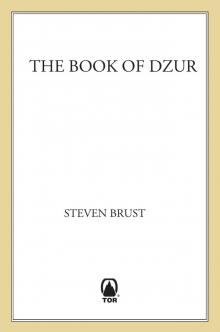 The Book of Dzur: Dzur ; Jhegaala
The Book of Dzur: Dzur ; Jhegaala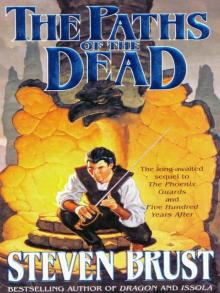 The Paths of the Dead
The Paths of the Dead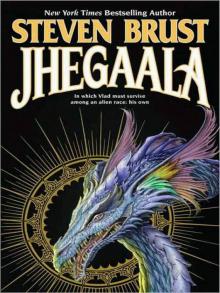 Jhegaala
Jhegaala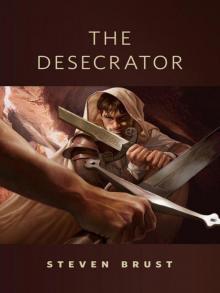 The Desecrator: A Tor.com Original
The Desecrator: A Tor.com Original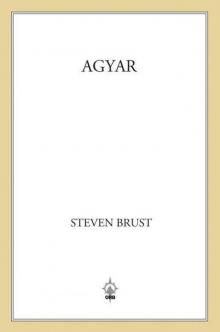 Agyar
Agyar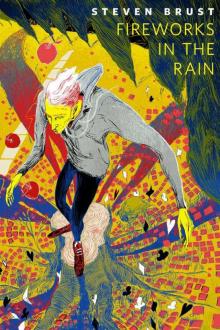 Fireworks in the Rain
Fireworks in the Rain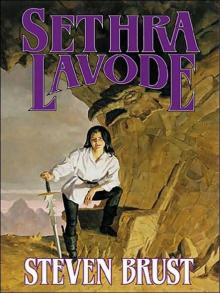 Sethra Lavode
Sethra Lavode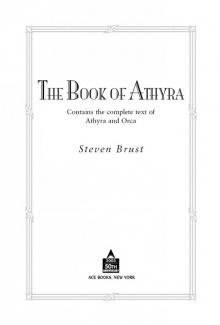 The Book of Athyra
The Book of Athyra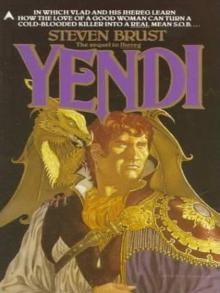 Yendi
Yendi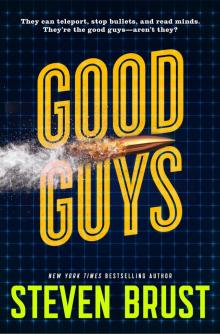 Good Guys
Good Guys The Book of Jhereg
The Book of Jhereg Cowboy Feng's Space Bar and Grille
Cowboy Feng's Space Bar and Grille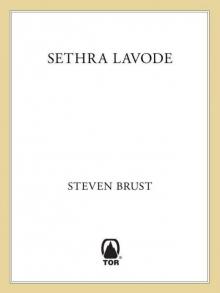 Sethra Lavode (Viscount of Adrilankha)
Sethra Lavode (Viscount of Adrilankha) My Own Kind of Freedom
My Own Kind of Freedom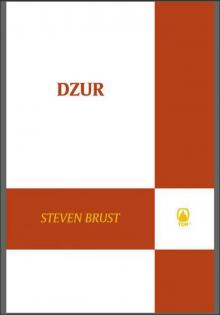 Dzur (Vlad Taltos)
Dzur (Vlad Taltos)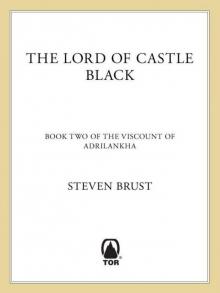 The Lord of Castle Black: Book Two of the Viscount of Adrilankha
The Lord of Castle Black: Book Two of the Viscount of Adrilankha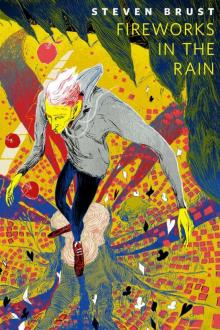 Fireworks in the Rain: A Tor.Com Original
Fireworks in the Rain: A Tor.Com Original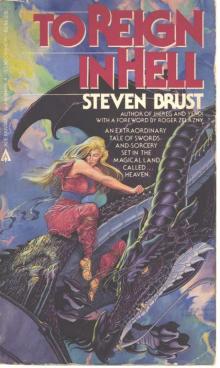 To Reign In Hell
To Reign In Hell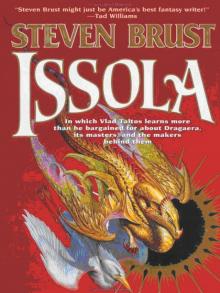 Issola
Issola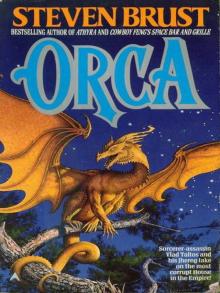 Orca
Orca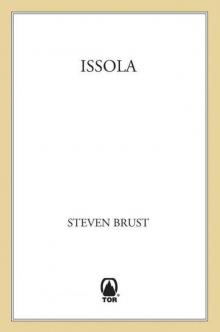 Issola (Vlad Taltos)
Issola (Vlad Taltos)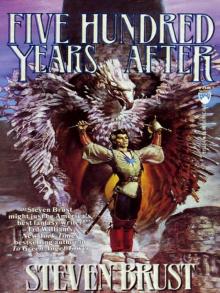 Five Hundred Years After
Five Hundred Years After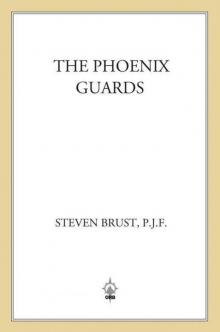 The Phoenix Guards
The Phoenix Guards Taltos
Taltos![[Vlad Taltos 06] Athyra Read online](http://i1.bookreadfree.com/i1/03/24/[vlad_taltos_06]_athyra_preview.jpg) [Vlad Taltos 06] Athyra
[Vlad Taltos 06] Athyra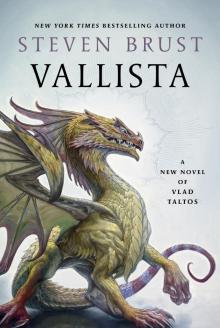 Vallista--A Novel of Vlad Taltos
Vallista--A Novel of Vlad Taltos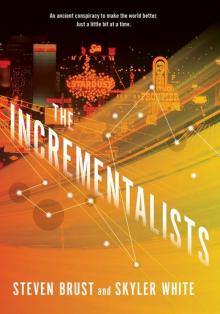 The Incrementalists
The Incrementalists![[Vlad Taltos 04] Taltos Read online](http://i1.bookreadfree.com/i/03/24/[vlad_taltos_04]_taltos_preview.jpg) [Vlad Taltos 04] Taltos
[Vlad Taltos 04] Taltos![[Vlad Taltos 03] Teckla (v 1.1) Read online](http://i1.bookreadfree.com/i1/03/27/[vlad_taltos_03]_teckla_v_1_1_preview.jpg) [Vlad Taltos 03] Teckla (v 1.1)
[Vlad Taltos 03] Teckla (v 1.1) The Book of Taltos
The Book of Taltos The Paths of the Dead (Viscount of Adrilankha)
The Paths of the Dead (Viscount of Adrilankha)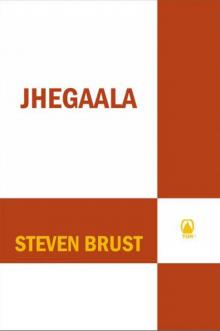 Jhegaala (Vlad Taltos)
Jhegaala (Vlad Taltos)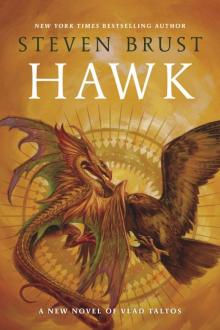 Hawk (Vlad)
Hawk (Vlad)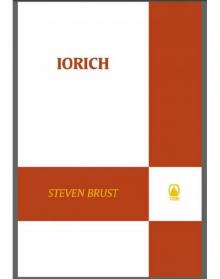 Iorich
Iorich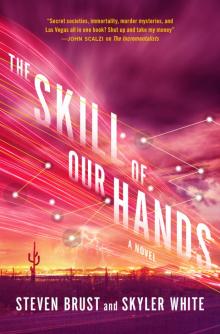 The Skill of Our Hands--A Novel
The Skill of Our Hands--A Novel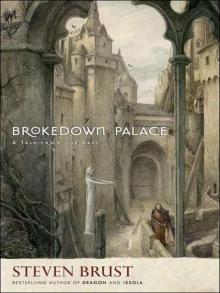 Brokedown Palace
Brokedown Palace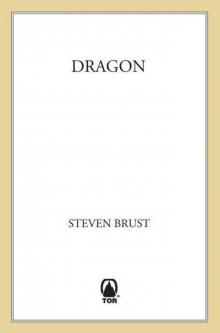 Dragon (Vlad Taltos)
Dragon (Vlad Taltos) Dragon
Dragon Athyra
Athyra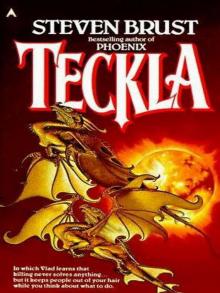 Teckla
Teckla Dzur
Dzur